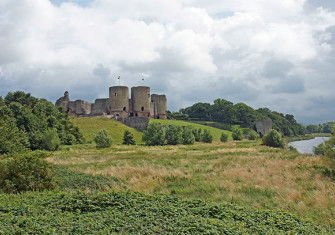An Anglo-Welsh truce renewed
On August 1st, 1259, the English renewed a truce which recognised Llywelyn ap Gruffydd as Prince of Wales.

Welsh independence in the 13th century did not mean separation from England – substantial areas were controlled by English barons – but the preservation of Welsh culture and local self-government in the Welsh heartland, with a native prince topping the feudal pyramid. The other native Welsh lords would do homage to him and he would do homage to the King of England. This state of affairs was achieved for a time by Llywelyn the Great, Prince of Gwynedd in the Welsh north-west, who took shrewd advantage of King John’s troubles with his rebellious baronage in England, but it was not to the liking of the English royal regime. When Llywelyn died in 1240, his eldest son, Gruffydd, was a prisoner in the Tower of London. Gruffydd tried to escape on St David’s Day, March 1st, in 1244, but his makeshift rope of sheets and hangings gave way and he fell to his death. He left four sons, the second of whom was Llwelyn ap Gruffydd, later to be known as Llywelyn the Last.
Llewelyn subdued his brothers by force to become master of Gwynedd in 1255. He then followed his grandfather’s example, made himself the leader of the native Welsh lords and took advantage of Henry III’s difficulties with his English barons. In 1258, when Henry was virtually dethroned, Llywelyn proclaimed himself Prince of Wales, and the English, who for the time being had enough to cope with in their own country, signed a truce with him. It was renewed in August 1259. Llywelyn had an understanding with the English rebel leader Simon de Montfort and, even after the rebellion in England collapsed and de Montfort was killed in battle in 1265, the Treaty of Montgomery of 1267 recognised Llywelyn as Prince of Wales, for which he did homage to Henry III.
Llywelyn was the only Welshman ever to be recognised as Prince of Wales by an English king, but Henry’s son, who succeeded him as Edward I in 1272, was a man of a different stamp altogether. He brooked no opposition in England or anywhere else. Llywelyn seems to have underestimated him badly. He repeatedly refused to meet Edward to pay him homage. Edward invaded Wales with overwhelming force and in 1277 Llywelyn was made to accept an ignominious peace treaty and a large fine (which Edward later waived). He was allowed to keep the homage of only five insignificant Welsh lords and, though he retained his Prince of Wales title, it was now meaningless. When Llywelyn rebelled in 1282, he was ambushed and killed near Builth. His head was cut off and stuck up on a spike at the Tower of London, mockingly crowned with ivy. Today a 1966 memorial near Builth Wells marks the place where Llywelyn the Last met his end.





